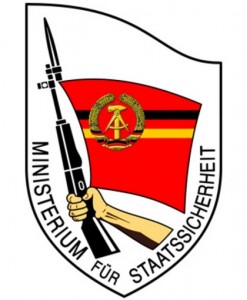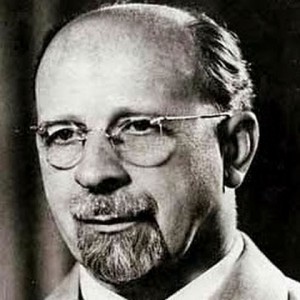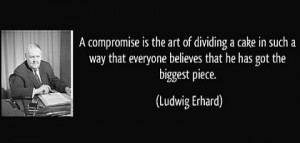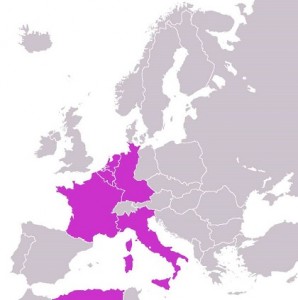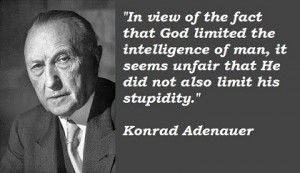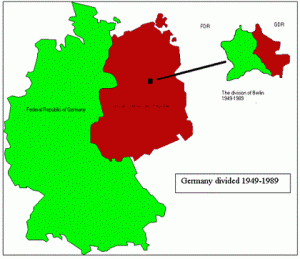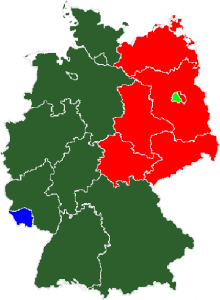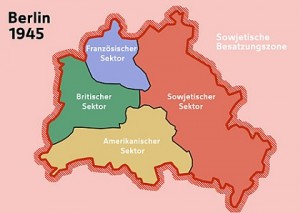The most important instrument employed by East German authorities to guarantee their absolute rule was the State Security Service (Staatssicherheitsdienst, commonly referred to as the Stasi). Founded in early 1950 as the secret service branch of the Ministry for State Security (Ministerium fuer Staatssicherheit--MfS), the Stasi came to exercise … [Read more...]
The Ulbricht Era, 1949-71
Soviet dictator Stalin died in March 1953. In large portions of the East German population, particularly among workers suffering under the high production quotas set by the SED, Stalin's death gave rise to hopes for an improvement in living conditions and for an easing of political terror. In an attempt to stave off increasing unrest among the … [Read more...]
Ludwig Erhard and the Grand Coalition
Konrad Adenauer assumed the chancellorship of the newly founded FRG in 1949, at the age of seventy-three. From the beginning, his primary foreign policy goals had been the achievement of German reunification through a policy of strength, the building of strong relations with the United States, and reconciliation with France. Until the elections … [Read more...]
Social Market Economy in Germany
Germany's economic growth during the first decades after the war at times overshadowed its marked success at joining the international community. In 1945 the country's economy was shattered. A good part of what survived was later dismantled and carried off by the victorious Allies. Within Germany there was much argument about how to rebuild the … [Read more...]
Rearmament and the European Defense Community
The outbreak of the Korean War in 1950 convinced Western leaders of the growing threat of international communism. The United States began to encourage the Europeans--the FRG in particular--to contribute to their own defense. For Germany, five years after having lost the most devastating of all wars, this meant forming an army, a step unthinkable … [Read more...]
West Germany and the Community of Nations
At the end of World War II, Germany was a defeated nation occupied by foreign powers. It had lost its national sovereignty, and the world saw it as a pariah, guilty of crimes without parallel in history. In addition to rebuilding their shattered country in a physical sense, most leading German politicians saw their main goals in the coming decades … [Read more...]
The Birth of the German Democratic Republic
As with the birth of the FRG, the formation of a separate nation-state in the Soviet zone also took only a few years. In late 1947, the SED convened the "German People's Congress for Unity and a Just Peace" in Berlin. To demonstrate the SED's claim of responsibility for the political future of all Germans, representatives from the Western zones … [Read more...]
The Birth of the Federal Republic of Germany
Participants at the Potsdam Conference had agreed that the foreign ministers of the four victorious powers should meet to implement and monitor the conference's decisions about postwar Europe. During their fifth meeting, held in London in late 1947, prospects for concluding a peace treaty with Germany were examined. Following lengthy discussions on … [Read more...]
The Creation of the Bizone
By early 1946, the Western Allies--the United States and Britain in particular--had become convinced that Soviet expansionism had to be contained. The Soviet Union's seizure of Polish territory and the drawing of the Oder-Neisse border (which gave formerly German territory to Poland), its antidemocratic actions in other countries occupied by Soviet … [Read more...]
Postwar Political Parties in Germany and Democratization
The reintroduction of democratic political parties in Germany was one of the primary concerns of the Allies during the final phase of the war. The Soviet authorities were the first to reestablish political parties in their zone. They ordered the formation of political parties on June 10, 1945, well before such a directive was issued in the Western … [Read more...]
- « Previous Page
- 1
- …
- 3
- 4
- 5
- 6
- 7
- …
- 13
- Next Page »
